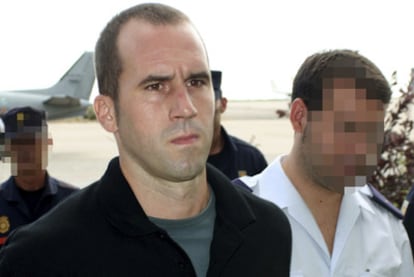Ex-ETA military chief calls for end to violence
The terrorist responsible for the 2006 Barajas bombing, "Txeroki," says Basque independence strategy must be a political one
After being arrested in France and transferred to Spain for trial, a former ETA leader has stated that "armed struggle is no longer called for." Garikoitz Aspiazu, known as "Txeroki," was until November 2008 the military head of the terrorist group that has killed over 800 people since the early 1970s.
Now, this notorious hardliner, whose belligerence effectively ended the most recent talks with the government, says terrorist attacks (or armed struggle, in ETA's lingo) "must give way to political struggle."
"Just as we've spent 50 years with the strategy of armed struggle, it is now time to change strategies, perhaps for another 50 years," said Txeroki in recent conversations he had at Navalcarnero penitentiary in the Madrid region, and which EL PAÍS had access to.
"It is now time to change strategies, perhaps for another 50 years"
The non-violent strategy paid off in May's elections with Bildu's success
Txeroki, 38, was ETA's most important military leader of the 21st century - and the most bloodthirsty - since the 2001 arrest of Javier García Gaztelu, alias "Txapote." An indication of his status is the fact that Prime Minister José Luis Rodríguez Zapatero made a public statement when Txeroki was arrested in Cauterets, France on November 7, 2008.
His personal involvement in attacks includes the assassination of Judge José María Lidón in November 2001 and the car-bomb attack which maimed Eduardo Madina, now a Socialist deputy, in 2002. As head of ETA's military section since 2003, he was ultimately responsible for the breakdown of government-ETA talks in 2006 having organized the bombing of Barajas airport that killed two people in December of that year.
Even after his French arrest and replacement at the top of ETA's organization chart, Txeroki continued to be defiant in his defense of violence. Basque radical pro-independence circles, known as abertzale and traditionally sympathetic to ETA, criticized him for breaking the negotiations with the government.
This kind of track record underscores the importance of Txeroki's recent statements condemning violence as a means to achieve political goals. Traditionally, only veteran ETA inmates - those who led the group as far back as the 1980s - have spoken out against terrorist violence in recent times. The list of such individuals includes Francisco Múgica Garmendia, known as "Pakito," ETA's military chief during that decade. But Txeroki has done so in record time, after just two-and-a-half years in prison.
In his role as the main military figure in the new generation of ETA members who publicly reject the use of violence, Txeroki proves that even the younger etarras seem convinced that peaceful, political channels are the best way to take things from here.
His anti-violence statements will also create new expectations regarding the more than 600 ETA inmates in Spanish prisons, most of which now support politics over guns. Fewer than 10 percent of them - all arrested in the last five years - continue to defend terrorist attacks as the best way forward. Txeroki's words will surely have an effect on them.
Increasingly, it is possible to hear conversations among ETA inmates containing sentences such as the following: "ETA is a corpse... but how to bury it? They're throwing more spadefuls of earth on it than one could imagine."
Jailed members are quite aware of the ongoing confrontation between leaders of the terrorist group and radical politicians who once faithfully supported ETA, and who now say they favor politics without attacks. What fewer people are aware of is that ETA attempted to win its showdown with the abertzale by trying to blow up a Madrid landmark, the KIO Towers, in January 2010. Only the fact that police intercepted a van containing the explosives along the Portuguese border prevented it. Around that time, the abertzale were conducting local assemblies to vote in favor of taking the pro-independence fight into the political arena and against the continued use of violence. When the town-by-town vote ended, in February 2010, there was 80 percent support for the non-violent thesis.
Things got even better for the abertzale with the March 2011 arrest of two ETA hardliners, Alejandro Zobaran and Mikel Oroz. Just weeks later, ETA announced an end to its "revolutionary tax," a historical funding method based on extortion letters to Basque businesspeople.
The abertzale's new non-violent strategy paid off in local elections last May, when, running as a coalition named Bildu (which was allowed to run following a narrow ruling by the Constitutional Court determining it was not directly connected to ETA), they became they became the second most-voted force in the Basque region.
In a separate development, the French police last Thursday arrested an ETA suspect in the possession of electronic bomb-making material. Iñaki Domínguez Atxalandabaso was detained while on a train returning to France from Italy, where he had purchased the equipment.

Tu suscripción se está usando en otro dispositivo
¿Quieres añadir otro usuario a tu suscripción?
Si continúas leyendo en este dispositivo, no se podrá leer en el otro.
FlechaTu suscripción se está usando en otro dispositivo y solo puedes acceder a EL PAÍS desde un dispositivo a la vez.
Si quieres compartir tu cuenta, cambia tu suscripción a la modalidad Premium, así podrás añadir otro usuario. Cada uno accederá con su propia cuenta de email, lo que os permitirá personalizar vuestra experiencia en EL PAÍS.
¿Tienes una suscripción de empresa? Accede aquí para contratar más cuentas.
En el caso de no saber quién está usando tu cuenta, te recomendamos cambiar tu contraseña aquí.
Si decides continuar compartiendo tu cuenta, este mensaje se mostrará en tu dispositivo y en el de la otra persona que está usando tu cuenta de forma indefinida, afectando a tu experiencia de lectura. Puedes consultar aquí los términos y condiciones de la suscripción digital.








































